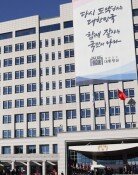Questioning verdict in trial of Gov. Lim
Questioning verdict in trial of Gov. Lim
Posted April. 03, 2001 19:10,
The Appellate Court has declared Gov. Lim Chang-Ryuel of Kyonggi Province not guilty. He had been sentenced in district court to a year in prison with a one year suspended sentence and 100 million won fine on charges of taking a 100 million won bribe in return for peddling his influence to prevent the liquidation of Kyonggi Bank. But the higher court reversed the lower court`s verdict on the grounds that he received the money without giving favors to the local bank. The appellate court`s ruling of not guilty had been anticipated when the lower court demanded the prosecution alter its written arraignment. Specifically, the higher court requested the prosecution to add a charge that he violated the Political Fund Law to the original charge of breaking the Additional Punishment Law on Specific Crimes. But the prosecution refused to comply with the court`s request. At that time, the prosecution contended that the court`s order on the alteration of the arraignment might have been intended to acquit him of charges of violating the special punishment law. This is to say that the appellate court had asked the prosecution to change the written indictment with a view to handing down a lighter sentence on the defendant on the political fund law violation, despite the fact that his influence-peddling was clearly specified in the prosecution`s findings.
Consequently, the appellate court judged Lim not guilty, clearing him of breaking the special punishment law on specific crimes. The court decision is likely to have grave repercussions, with the prosecution already raising accusations over court`s ``incomprehensible`` ruling. Raising our concern in this regard are the reasons for the court`s decision. In the written verdict, the presiding judge said that Lim had received the money from the bank in return for his alleged influence-peddling to prevent Kyonggi Bank from going under but that no evidence to prove the accusation was found. The judge went so far as to state that there were some allegations that he took bribes from the bank but that these charges seemed to have been fabricated by the prosecution. The prosecution, upset by the court`s claims, openly wondered how a prosecutor could conduct such a coercive investigation into a governor who was close to the ruling power. Dozens of witnesses testified that Lim took kickbacks, raising doubts about the background for the court decision.
In view of the fact that Lim`s wife Chu Hye-Ran was found guilty in both the lower and higher courts on charges of taking bribes in connection with the same scandal, there is much room for skepticism about the appellate court ruling. It remains to be seen how many people will accept the court`s ruling that Lim was not guilty, especially after his wife was found guilty. With the prosecution`s decision to take the case to the Supreme Court, the legal battle over the Lim case is expected to be settled in the nation`s highest court. We are concerned with what verdict the supreme court will hand down, especially with regard to the ``comprehensive bribery.``







